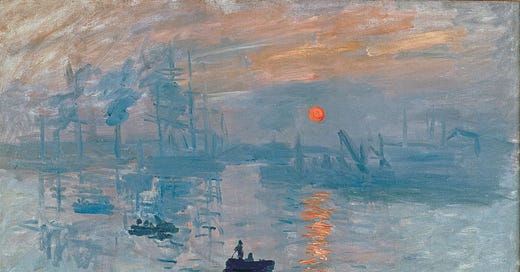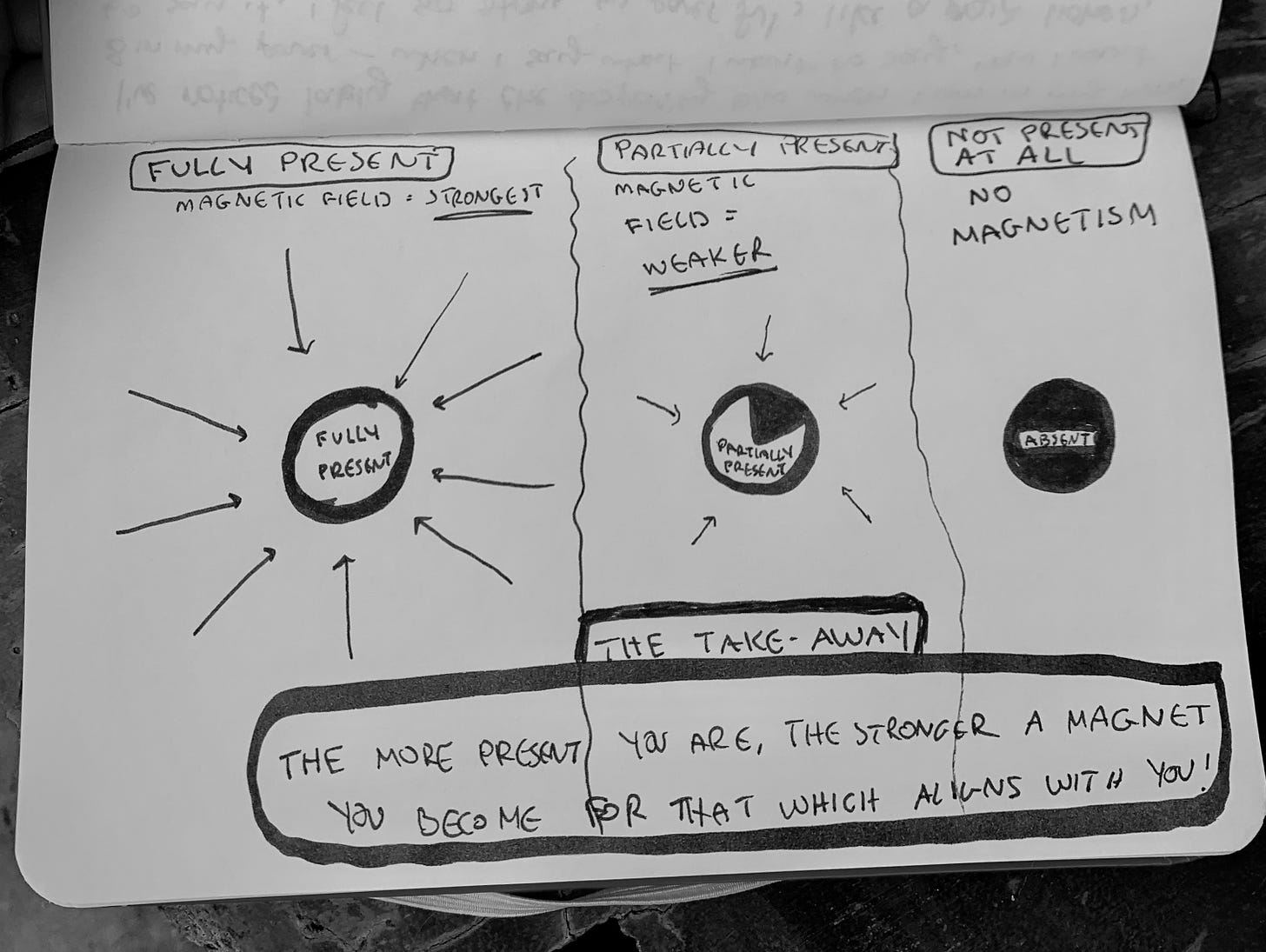“Brevity is the soul of wit.” — William Shakespeare, from Hamlet
I vividly remember the moment my professor said this in class. It was immediately etched into my mind. I liked both how brief it was(!), as well as the point it made: that the more we distill > the more potent our words become > the easier an idea is to digest > the higher its resonance.
We revere brevity—poetry, song lyrics, anything that distills complex ideas into simple, concise words is a wonder to us. This might also be why quotes are so enjoyable to consume: they distill big ideas in simple ways. Our mental metabolism acts the same as our real one, digesting bite-sized ideas better than big ones.
I’ve been reflecting a lot lately on the potency of the present moment—the power that every moment holds if we surrender to it, if we commit to being fully where we are. As I was pondering this quote about brevity, it occurred to me that it captures something much deeper: that the more potent something is, the stronger its effect. Wit is a peak experience of words. Wisdom, humour, resonance, insight all in one. Brevity captures the essence of what is being said.
Presence is like this too. When we are fully in the moment, we feel, see, hear, internalize things differently—more purely, more clearly. We become a stronger sender and receiver of everything. We become a more concentrated version of ourselves, a stronger magnet pulling in what aligns with us.
Complete presence melts self-consciousness and self-doubt away. It lets us stand in our true essence without the need for approval or validation. When we are fully present, our awareness is glued to the moment. The complexity of our inner world is collapsed into one point of awareness. This lets us express ourselves fully.

Try recalling a moment you remember clearly—one you can smell, hear, taste, see, feel on your skin. A moment so potent it could never be shaken from your mind. This is likely a moment where you were fully present, where you weren’t thinking about someone or something else. Where you surrendered to where you were, simplified your existence to a brief, potent, strikingly beautiful moment in time.
The more present we are, the more we relax into ourselves, the stronger a magnet we become for what aligns with us. That’s the paradox of the self: it is most potent when we are least focused on it.
Simplicity has always been a challenge for me. I have the opposite of a slant towards brevity. I like complexity, abstraction, nuance. I bask in spinning large and extravagant webs of words, long sentences, essays, conversations with all the complexities of an idea baked in. This parallels my relationship with myself in many ways: I am easily inspired, attracted to many things, I regularly have many loops of thought running at once. Surrendering to a present, quiet mind has always been tough for me. I like chaos. Love it, actually. Simplicity intimidates me at times. What about everything outside of this thought, this moment, this idea? What about the rest?
But chaos is only as valuable as the order it begets. Ideas are only as memorable as the packaging they come in. The moment is only as valuable as the attention we pay to it.
We are constrained by our ability to exercise restraint. The boundaries we set and protect determine our effectiveness, preventing our attention from leaking into anything but what matters most. I quite like Steve Jobs’ definition of focus:
“Focus means saying no to the hundred other good ideas. I'm actually as proud of the things we haven't done as the things I have done. Innovation is saying 'no' to 1,000 things. You have to pick carefully.”
Whenever I look back at a piece of writing I never published, I see one thing between those ideas and the world: distillation. Distillation gets us to completion, or more accurately, close enough to completion so that we can move on. Distillation is the challenge of overlaying brevity onto complexity. It is the process of revealing something as it truly is.
This is, I think, why I enjoy writing so much—or why I push myself to enjoy writing. It is a test of clarity, of potency, of brevity. I am forced to collapse my infinite loop of thought into a finite set of words. I am painting a picture that is necessarily constrained. I am communicating my ideas intentionally, simplistically, and hopefully concisely (though my word count may tell a different story).
Brevity has become this challenge—this hurdle I have to jump over each time I write: How can I say this more crisply? When I write (which is really just to say: when I think) it all boils down to one simple, but utterly excruciating question: What am I really trying to say here?
It’s a humbling one, because it exposes that most of the time we (or at least, I) have no idea what we are trying to say. I rarely know the essence until I’ve diverged enough to explore an idea fully, and converged enough to strip away the fat, discard the excess, and reached the yolk of the thought. There’s nothing like getting to that rich, creamy pot of brevity that encapsulates something grand with as few words as possible. Albert Einstein says:
“If you can't explain it simply, you don't understand it well enough.”
And I agree. This is mastery: illuminating big ideas, simply. Great thinkers demand nothing except your attention. And with that, they can reveal an entire world to you with a few words, in a few moments.
Just as this applies to writing, it applies to our attention too. To presence. To being where we are. The more attention we pay to the moment, the simpler it becomes. Because you are no longer juggling endless loops of thought at once. You’re exclusively focused on the precious moment you are in. And in doing so: you expand into it. In focusing your attention on one point—precisely where you are—you channel your infinite attention directly into it, instead of fracturing it endlessly, trying to be everywhere at once, but nowhere fully.
Anyone who has tried a mindfulness exercise knows it’s quite hard to be fully where you are. It takes practice, just as brevity does. The process of distillation is gruelling until it isn’t. It’s messy and chaotic until you see the essence staring back at you. Then it’s pure bliss.
There’s a quote about writing I often come back to: “I would have made it shorter, but I ran out of time.” The subtext being: it takes longer to distill than it does to expand, which: true.
Similarly, it is harder to be where you are than it is to let your mind expand in all these different directions. Do I still have your attention? Are you losing focus? Maybe, maybe not. Contracting our attention into the moment is hard, but it increases its potency, just as the brevity of words increases the potency of an idea, creating deeper grooves in the mind. If brevity is the soul of wit, then presence is the soul of experience. We cannot be fully ourselves until we are fully in the moment—attention nowhere but here.
This process of distillation never ends. We never “arrive” at distillation. It is a continuous process of refining. And that’s what makes it fun, you know? To know that we can always distill more crisply. That we can focus more powerfully. That our essence could be more potent. That our experiences can be deeper. That I could write this in half the length, if I really focused on what it is I’m trying to say.
That’s the thing about distillation: it’s humbling. It says: “go deeper, be clearer.” It’s a reminder that no matter how well we think we understand something, we can always distill it further. It’s a reminder that when we get mentally snagged on an idea we’ve already explored, that’s a craving for deeper understanding, a hunger for more depth, more rigour, more clarity—an urge I could go on about endlessly, but in the spirit of brevity I’ll stop myself here :).
Do you resonate with what I write about? Maybe we should work together: If you resonate with the ideas I write about and want to cultivate a life you genuinely enjoy living, where you align your actions with your values, move towards the changes you know you want to make, and consciously harvest self-knowledge in the process, send an email to isabel@mindmine.school or DM me on Twitter to explore what working together 1-1 would look like.
PS — If you enjoyed this, say hi on Twitter! You also might like a related piece I wrote: why I write.






“If brevity is the soul of wit, then presence is the soul of experience.” Loved that especially. Absolutely brilliant writing all around.
love love love this Isabel